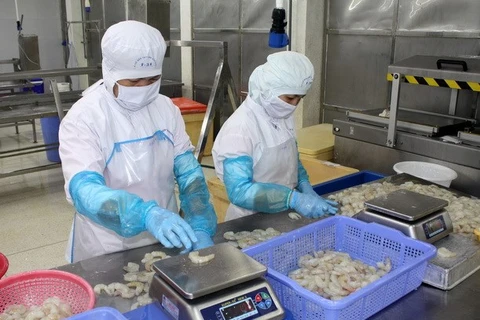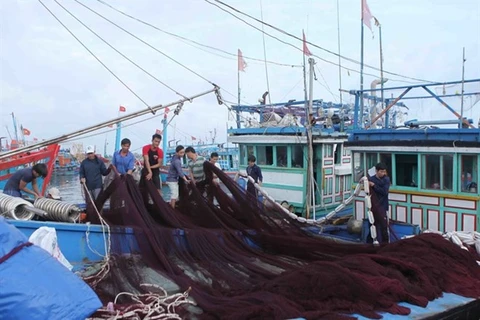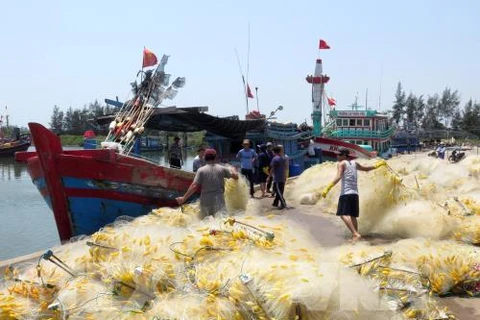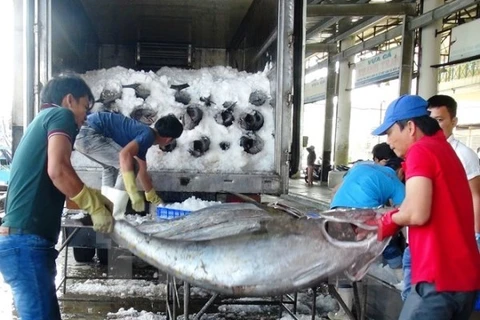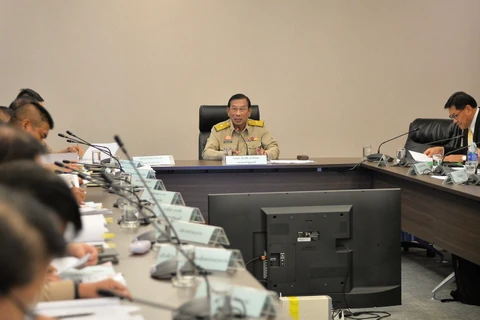New York (VNA) – The US’s Global Policy Journal website has said Vietnam may become a model for ASEAN countries in fighting illegal, unreported and unregulated (IUU) fishing.
An article published by the website on May 9 said the threat of a bad report card from the European Union (EU) has alarmed more than 30,000 Vietnamese commercial trawlers.
It quoted Tony Long, former Director of the World Wildlife Fund’s European Policy Office and senior fellow of the Global Government Institute, as saying that the EU carding system to drive out illegal fishing is showing it has teeth, adding that countries are terrified that the ultimate sanction, the red card, imposes potentially enormous financial sanctions and significant risks.
The article said, citing source as the Vietnam Association of Seafood Exporters and Processors (VASEP), that fishing is a cornerstone of Vietnam’s economy and since 2006, the nation has been globally ranked among the top 10 exporting countries in fisheries.
Vietnam’s export of fishery products to the EU and the US range between 1.9 and 2.2 billion USD, and 350 – 400 million USD, respectively.
The article said Vietnam’s Ministry of Agriculture and Rural Development (MARD), the Directorate of Fisheries and VASEP have mandated that all of them take actions to balance fishing capacity and fishing fleet policy. The new Fisheries Law has been approved by the National Assembly, including regulations to fight IUU.
Prime Minister Nguyen Xuan Phuc issued a national action plan to crack down on IUU fishing. As part of this drive, 62 seafood companies have joined to ensure sustainable practices.
The government has issued several decrees and directives, supplemented IUU fishing regulations to legal documents, enforced regulations, held educational workshops for fishermen, enhanced cooperation with coastal and island countries to prevent IUU fishing and organized regular dialogues with the EU on efforts to improve fisheries management.
Vietnam’s responses also include placing observers, many of whom are former fishing captains, aboard commercial trawlers to monitor catches.
Additionally, fishing captains have been encouraged to keep an accurate logbook or registry of catches for inspection or become subject to fines up to 2,000 USD and revocation of commercial fishing licenses.
The article said Hanoi simply does not want to repeat Thailand’s mistakes, where a high percentage of the fishing fleet is unregistered and outside government control. Neither does it want to follow its neighbour, Cambodia, and be at the end of the line with a red card from the EU and unable to export fish.
The article said the Vietnamese Directorate of Fisheries has developed a national fishery database that integrates data related to fishing vessels including registration, licensing, logbook entries and now uniformly-accepted software (VNFISHBASE) utilised in eight coastal provinces.
It added that there is a need for more vocational centres to educate fishermen about fishing regulations.
According to the Food and Agriculture Organization of the United Nations (FAO), between 11 and 26 million tonnes of fish, or 15 percent of the world catch, are caught illegally every year. As the world’s biggest fish importer, the EU does not wish to be complicit in these unsustainable fishing practices.
Since 2012, the EU Commission has initiated formal dialogues with several countries, thus the “yellow card” status warning. When significant progress is observed, the commission can end the dialogue or raise the status to a “green card”. When there is no or little compliance, it results in a failing grade - a “red card”, which translates into no exports.-VNA

